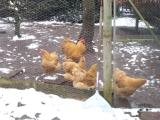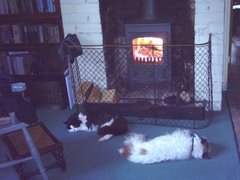Have you ever heard of the Dymock Poets? Sadly, not many people have. They were a band of men who, in the early 1900’s, formed their literary community. I love the area in which I live. The countryside, to me, is “real” countryside – working countryside filled with real people, many of whom have been here for generations. But there is a history too, and these men are woven into the atmosphere of the place and those of us who are lucky to live here are proud that they called this home.
Their names were: Robert Frost (an American poet), Lascelles Abercrombie, Rupert Brooke, Edward Thomas, Wilfred Wilson Gibson, and John Drinkwater, some of whom lived in and around the village of Dymock in the period between 1911 and 1914. The “resident” poets were: Frost, Abercrombie and Gibson and they were inspired by the beauty of their surroundings and encouraged by a succession of visitors, including Rupert Brooke, John Drinkwater, Edward Thomas, and Eleanor Farjeon (called Associated Dymock Poets!). They published their own quarterly periodical, entitled 'New Numbers', from Abercrombie’s cottage and it contained poems such as Brooke's masterpiece, The Soldier. It was despatched all over the world from the little village post office at Dymock.
Their poetry has now fallen out of favour, but during the early 20th century it was considered revolutionary. The poets used simple language and they wrote about ordinary events and people, moving away from the ornate and emotionally restricted style of the time. Lascelles Abercrombie, Rupert Brooke, John Drinkwater and Wilfred Wilson Gibson were contributors to Georgian Poetry and Eddie Marsh, the artistic and literary patron, edited the five volumes, whilst Harold Monro was their publisher. John Drinkwater was the first manager of the Birmingham Repertory Theatre in Station Street, which opened in 1913. He wrote several plays for the company; mainly historical pieces and light comedies.
Their idyllic time around the north-western borders of Gloucestershire was to prove short lived. Within three years both Brooke and Thomas were dead, Frost had returned to North America, and Abercrombie, Drinkwater and Gibson were involved in war work. Their writings, however, continue to form an important literary legacy to this day and an exhibition is to be found in the Parish church at Dymock, St. Mary’s, maintained by a dedicated group of local residents.
There are two “Poets’ Path” walks which link areas associated with the writers and their homes, (which are not open to the public as they are private residences) and my own hamlet is along the route they took as they walked across the fields to visit each other for their literary get-togethers. Lascelles Abercrombie lived in a timber framed thatched cottage (unnervingly called The Gallows) in a neighbouring village to mine and was the first of the poets to arrive in the area; Wilfred Wilson Gibson followed and he also lived in a timber framed, but part-thatched cottage (The Old Nail Shop) at the bottom of my lane and finally Robert Frost rented Little Iddens, a dilapidated 400 year old cottage a little further away at Ledington (also known as Leadington). This area is sandwiched between May Hill and the Malverns, both of which provided inspiration for the poets, along with the woodlands filled with our famous wild daffodils – the Dymock Daffodils.
I shall leave you with two of their poems:
The Soldier
If I should die, think only this of me:
That there's some corner of a foreign field
That is forever England. There shall be
In that rich earth a richer dust concealed;
A dust whom England bore, shaped, made aware
Gave, once, her flowers to love, her ways to roam
A Body of England's, breathing English air,washed by rivers, blest by sons of home.
And think, this heart, all evil shed away,
A pulse in the eternal mind, no less
Gives somewhere back the thoughts by England given;
Her sights and sounds; dreams happy as her day;
And laughter, learnt of friends' and gentleness
In hearts at peace, under an English heaven.
Rupert Brooke 1887 – 1915
And finally, in the haunting words of Wilfrid Gibson:
...in the cosy cream washed living room
Of the Old Nail Shop, we all talked and laughed -
We sat there in the lamplight, while the day
Died from rose-latticed casements, and the plovers
Called over the low meadows, till the owls
Answered them from the elms, we sat and talked...
'Twas in July
On nineteen fourteen that we talked
Then August brought the war and scattered us.
The figures dissolve. The echoes die away. Ou sont les neiges d'antan? Now the Dymock daffodils, albeit thinner ranked than of yore, nod sagely silent in the breeze, a little fugitive sunlight warms the young bones of a new spring's generation...the lambs skip, the guns are spiked, old tragedies lie crumbling below encrusting coats of tear-absorbing moss.
Should you be interested to learn more about the poets, I have posted a link below:http://www.encyclopedia.com/doc/1G1-72986213.html
Monday, 23 April 2007
Subscribe to:
Post Comments (Atom)







8 comments:
yes, yes l used to live at Corse Lawn before moving north, my dad comes from newent & mum taught at Pauntley school. how's the daffs?
I am a great poet fan amd did brooke and frost at school. thank you for reminding me.
How funny, I have just been reading about Brooke! Very informative blog, Woozle. I had heard of the Dymock Poets but didn't know much about them. Beautifully put together blog with real links and everything - oh envy! xx
Thak you so much for the welcome! I'm having a very trying day so will try to post something sensible after said glass of wine. Excellent suggestion. It all feels very new here and I feel like a new girl at the school - but it looks good!
got my message and posted an answer,thankyou. That is so interesting to have that bit of history on your doorstep. I recognised the first couple of lines from the Brooke's poem. Is it used on Rememberance day? It sounds very familiar. I will blog soon but older boys have me booked for the evening as their dad is away. Have sneaked in here but have been requested for tumbling monkies so got to go.
Thank you for the welcome, and for that wonderful blog. I knew of most all of those poets, but thanks to you, now know lots more. Isn't that a beauty of this site -- that we can trade all sorts of interests and information, helping all of us to grow. (Have I told you that 1967 was the year I moved to New York, right after graduating from college?) So, you are quite a youngster from my vantage point.
Best wishes.
Frances
I knew nothing about the Dymock poets, just the odd individual.
I have always loved that Rupert Brook but didn't know the Wilfred Gibson, it is lovely. Thank you.
Very nice to be reminded of Frost and Brooke. We had to memorize a lot of Frost when I was at school, and I remember the Soldier poem from Remembrance Day as well.
Post a Comment